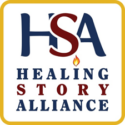By Peggy Helmick-Richardson.
For it was a saying among them that a man is not really dead until he is forgotten. —“Cow-Tail Switch” from A Treasury of African Folklore, Harold Courlander.
Born in 1924, Hilda Stern Cohen was raised in the tiny German village of Nieder Ohmen. When Hitler came to power, Hilda and her family were relegated first to the Lodz Ghetto where her fiancé, parents and grandparents died. Then came Auschwitz and eventually a displaced persons camp in Austria where Hilda scrambled for valuable scraps of paper to record her poems. Eventually, she made her way to the United States where she married Dr. Werner Cohen and raised three children. Her poetry was hidden away and shared with no one.
Gail Rosen, the founder and current chair of the Healing Story Alliance, has been telling stories for sixteen years. A full-time storyteller for the last three years, she defines her primary impetus as “supporting people through challenges and changes to help them find and make meaning of the experiences in their lives, including their losses.”
Gail first met Hilda nine years ago at a Holocaust memorial event, where she heard Hilda share her amazing story. When Hilda discovered that Gail was a storyteller, she asked her to continue telling her story after her death.
“My stomach sank because of the immensity of her story, but I felt obligated to tell it’” Gail explains. Within a year of completing the interviews, Hilda died. Compelled by a need to keep Hilda’s story alive, Gail refused to allow the challenge to overwhelm her.
After Hilda’s death, her husband Werner discovered her writings tucked away in the back of a drawer. These now yellowed scraps of paper included 150 poems. Last year, Hilda’s Genagelt ist meine Zunge (My Tongue is Chained) was published in German through a joint project of the Goethe-Institut Washington and the Research Center for Holocaust Literature at the University of Giessen. The original works will become part of the archives of Yad Vashem, the Holocaust memorial and museum in Jerusalem.
“They certainly speak of her pain and horror,” Gail explains. “But at the same time, they also speak of her faith and her hope and her intentions to have a full and rich life in spite of what she suffered.”
Three years ago, Gail participated in a Compassionate Listening project aimed at German and Jewish reconciliation in Germany, partially funded by a NSN grant. On this trip, Gail shared Hilda’s story. She also met Eve Rennebarth, a 30-year-old German filmmaker.
Gail returned to Germany a year later, to promote Hilda’s book of poetry. Eve read Hilda’s poems in German and Gail shared Hilda’s story in English. The two women presented this program in Giessen as well as in the small village where Hilda was born.
Last year, Gail revisited Germany as an assistant facilitator for Compassionate Listening. Again she was provided an opportunity to share Hilda’s story. This February, Hilda’s story took Gail to Israel.
Gail tells us, “Hilda says, ‘You have to look at the abyss which is yourself. This humanity that we all share is for every one of us to look at, deal with, then transform it, to make it into something that is noble.’ When I say these words of hers in Israel, I hear them in a different way. It is stunning – the history and age of the civilizations, and all the pain and rage and fighting that have gone on there.”
Audiences heard Hilda’s story at the Goethe Institut in both Tel Aviv and Jerusalem. Among the listeners were two of the Cohen’s grandsons in Yeshiva and Gail had the opportunity to hold Hilda’s 9-month-old great- granddaughter.
While in Tel Aviv, Gail attended a storytelling meeting in the home of another HSA member, Dvora Sherman. “A dozen people came and made me feel very welcome, including Rinah Sheleff, who invited Dvora and me to Sabbath dinner.”
Gail now shares “the journey of this story and the constellation of healing that has happened around this story – for myself, Hilda’s widower, Eve, the people I have met through the Compassionate Listening Project, young students from Hilda’s village. The stories about Hilda have changed people, opened them up, increased understanding and awareness.” Gail will tell this story, which she titles “Choose Life,” at the HSA concert in Bellingham in July.
Gail is uncertain what the future holds for Hilda’s story. “I’ve been following where the story has been leading me without any ultimate goal in mind, ” she notes. “And the journey has been incredibly rich and rewarding. We talk about trusting the story and I really need to do that. Part of Hilda’s story is so painful. I have to trust Hilda and the story to carry us through to a place of hope at the end.”
Peggy Helmick-Richardson, along with husband Gene, tells at various venues including a treatment center and domestic violence shelter. She is currently president of the Dallas Storytelling Guild.
Originally published in the HSA Newsletter, Spring 2004
